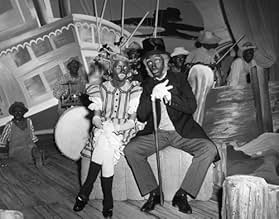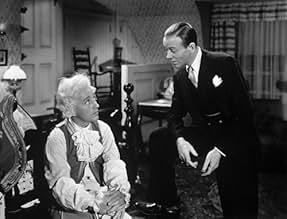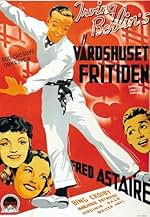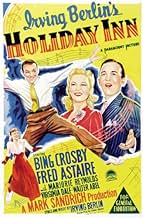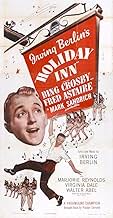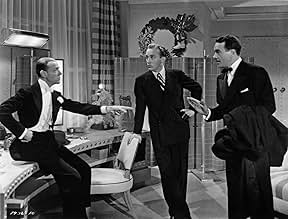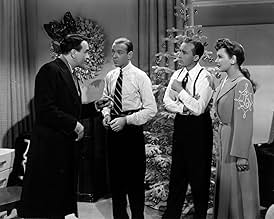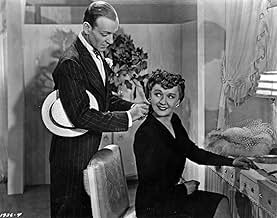In einem Gasthaus, das nur an Feiertagen geöffnet hat, wetteifern ein Schnulzensänger und ein Hufschmied um die Zuneigung einer schönen Nachwuchsdarstellerin.In einem Gasthaus, das nur an Feiertagen geöffnet hat, wetteifern ein Schnulzensänger und ein Hufschmied um die Zuneigung einer schönen Nachwuchsdarstellerin.In einem Gasthaus, das nur an Feiertagen geöffnet hat, wetteifern ein Schnulzensänger und ein Hufschmied um die Zuneigung einer schönen Nachwuchsdarstellerin.
- 1 Oscar gewonnen
- 3 Gewinne & 2 Nominierungen insgesamt
- Orchestra
- (as Bob Crosby's Band)
- Second Dancer Ted Bumps Into
- (Nicht genannt)
- Dancer
- (Nicht genannt)
- Dancer
- (Nicht genannt)
- Midnight Club Orchestra Leader
- (Nicht genannt)
- Dancer
- (Nicht genannt)
Empfohlene Bewertungen
Sure, not all the holidays are treated in the film. And the Independence Day segment contains some war-time "propaganda" with newsreel shots of McArthur, FDR, & military hardware. But this was the era when Hollywood went to war & stars did pitches to audiences to buy war bonds, etc. Yes, the black-face Al Jolson style "Abraham" number causes me to cringe a bit, but the tune is snappy, and the justification is in keeping with the plot as Bing tries to hide Marjorie Reynolds from Astaire. The supporting characters are also fine. There's "Gus" the cab driver for the Inn, whom Bing gives 10 bucks to take a detour to keep Reynold's away from the Inn the night the Hollywood men are there. Bing says for that kind of money Gus should take her by way of "Medicine Hat" (a prairie town in Canada). I also enjoy character actress Louise Beavers portrayal of "Mamie", the Inn's cook. She's not only a mother figure to her two charming kids, but also to her boss. During Thanksgiving, Bing mopes while Astaire & Reynolds are filming in Hollywood together. He puts on a recording of himself singing "I've Got Plenty To Be Thankful For", while he comically criticizes himself - even saying "you're flat". Mamie tells him that all he did was tricks to keep Miss Linda. He was never honest with her & instructs him to go to Hollywood & tell her how he feels. The song "White Christmas" became a huge hit with this movie. It's sung twice. The first time, Bing is teaching it to Reynolds on the piano & they sing a duet with his coaching. The second time, at the end, it's an unplanned duet. Reynolds is singing it on a sound stage "mock-up" of the Inn, once again at a piano. She finds that at the same spot in the song as Bing had done earlier, she picks up his pipe & rings bells on a tree. Then Bing begins to whistle in the wings. Her solo is interrupted as Bing then sings a line or two. The song isn't completed this time! In the later film, Bing sings the immortal song "just like the record". "Easter Parade" was another Irving Berlin hit from this movie. It would inspire another Astaire movie later with that title.
This is not a perfect film but it has been an inspiration to me (& to others). The Inn is timeless. I can always re-visit every year or so & the comedy, songs & dance are eternal. Styles change. If "Jim Hardy's" Holiday Inn had been a real place, it probably wouldn't survive. The resorts of the Catskills, such as those in "Dirty Dancing" fell to changing times. Jim probably would have had to have rock acts in the 1950's (or Rap in the 1990's)! But I can always go home to this Inn & know what kind of enertainment is on tap. And also enjoy Mamie's cooking!
Reviewers who fault this movie for it's patriotism and display of martial force in the midst of a "holiday" movie are obviously too young to know what the world was like when this was made. It was a time of greater innocence, greater danger and greater racial discrimination. The innocence was that of the children and the general public who could take a "standard Hollywood plot" at face value. It was a time of danger, not necessarily from within society itself (as now when crime makes streets unsafe) but from the outside with dictators killing millions while they battle for world domination. Those tanks and planes WERE freedom. Without them we would be yelling "Seig Heil" today and would not have the right to critique a simple movie. The State would have made it for you and "you Will like it"!
As the "black face" routine was showing I turned to my family and said that I was sure that despite the "classic" status of this film there were probably a lot of people wincing as they watched Bing Crosby with burnt cork all over him.
I'm sure that before he died Bing too winced a little bit at that number, but taken in the context of history it was to be expected. Al Jolson made a career of blackface and never regretted it for a minute. Most of the American population accepted that that's "the way it is". Only in the last 40 years have we learned that's NOT the way it is.
Things change and it's understandable that after almost 60 years certain depictions of society as it existed then would be out of place today. 20 years ago the movie was popular but the music was certainly out of style. With the resurgence of the "big band sound" in the last 5-10 years people are noticing that Bob Crosby and the Bobcats were participants. No doubt a certain amount of nepotism existed, but Bob Crosby was not Billy Carter to Bing's Jimmy Carter. (Anyone under 20 can now run and look up Jimmy and Billy Carter.) Bob Crosby achieved a certain amount of star status with some of his recordings. He had 4 chart topping hits and led bands for almost 50 years. He was always eclipsed by his older brother, but then Bing Crosby was THE biggest star of that time, at least among singers.
Bob's music was a Dixieland style and it lent a lightness to the big band orchestrations of Irving Berlin's songs that might have otherwise made the music ponderous, too much so for this light comedy at least.
Remember, finally that when Holiday Inn came out we were losing WW2. The Pacific was a Japanese ocean, the Atlantic was virtually controlled by German U-Boats and Allied ships were being sunk within sight of American cities. The Axis also controlled all of Europe and the Russians were being rolled back into their own homeland.
Holiday Inn was escapist entertainment from this bleak reality and it is understandable if some martial patriotism was included to hearten the home front.
For 90% of the U.S., snow at Christmas is the exception rather than the rule, but the emotions expressed by the song White Christmas hit exactly the feelings of millions of soldiers taken from their homes to fight a war. If Holiday Inn did nothing else, it gave Americans something to believe in and remember when things were at their darkest.
"May your days be merry and bright, and may all your Christmases be White."
Astaire, Crosby, and Reynolds have great chemistry together: I thought it quite convincing how Crosby's overprotective zeal scared Reynolds away for a while, and Astaire was very cool and believable as a kind of an inoffensive opportunist who exploits Crosby's passionate responses to whatever threat he perceives in Astaire.
Top it off with many of Irving Berlin's best classic tunes, performed in interesting interpretations, and you have a very good musical film.
Wusstest du schon
- WissenswertesThe Connecticut inn set for this film was reused by Paramount 12 years later as a Vermont inn for the musical Weiße Weihnachten (1954), also starring Bing Crosby, and again with songs composed by Irving Berlin.
- PatzerThe telegram that Ted Hanover receives from Jim Hardy on Christmas Eve is dated December 25th.
- Zitate
Linda Mason: My father was a lot like you, just a man with a family. Never amounted to much, didn't care. But as long as he was alive, we always had plenty to eat and clothes to keep us warm.
Jim Hardy: Were you happy?
Linda Mason: Yes.
Jim Hardy: Then your father was a very successful man.
- Crazy CreditsIn the opening titles the main credits for Irving Berlin as composer and lyricist, and Mark Sandrich as producer and director, are each facsimiles of their genuine signatures.
- Alternative VersionenIn 2008, the film was restored and colorized by Legend Films.
- VerbindungenFeatured in Concept (1964)
- SoundtracksOverture
(uncredited)
Music and Lyrics by Irving Berlin
Performed by the Paramount Pictures Studio Orchestra and Chorus conducted by Robert Emmett Dolan
Top-Auswahl
Details
Box Office
- Budget
- 3.200.000 $ (geschätzt)
- Weltweiter Bruttoertrag
- 80 $
- Laufzeit
- 1 Std. 40 Min.(100 min)
- Farbe
- Seitenverhältnis
- 1.37 : 1


